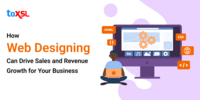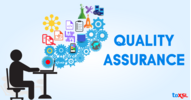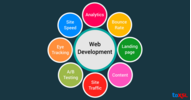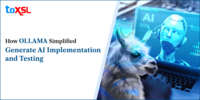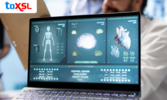- Dec 24, 2025
Share this post on:
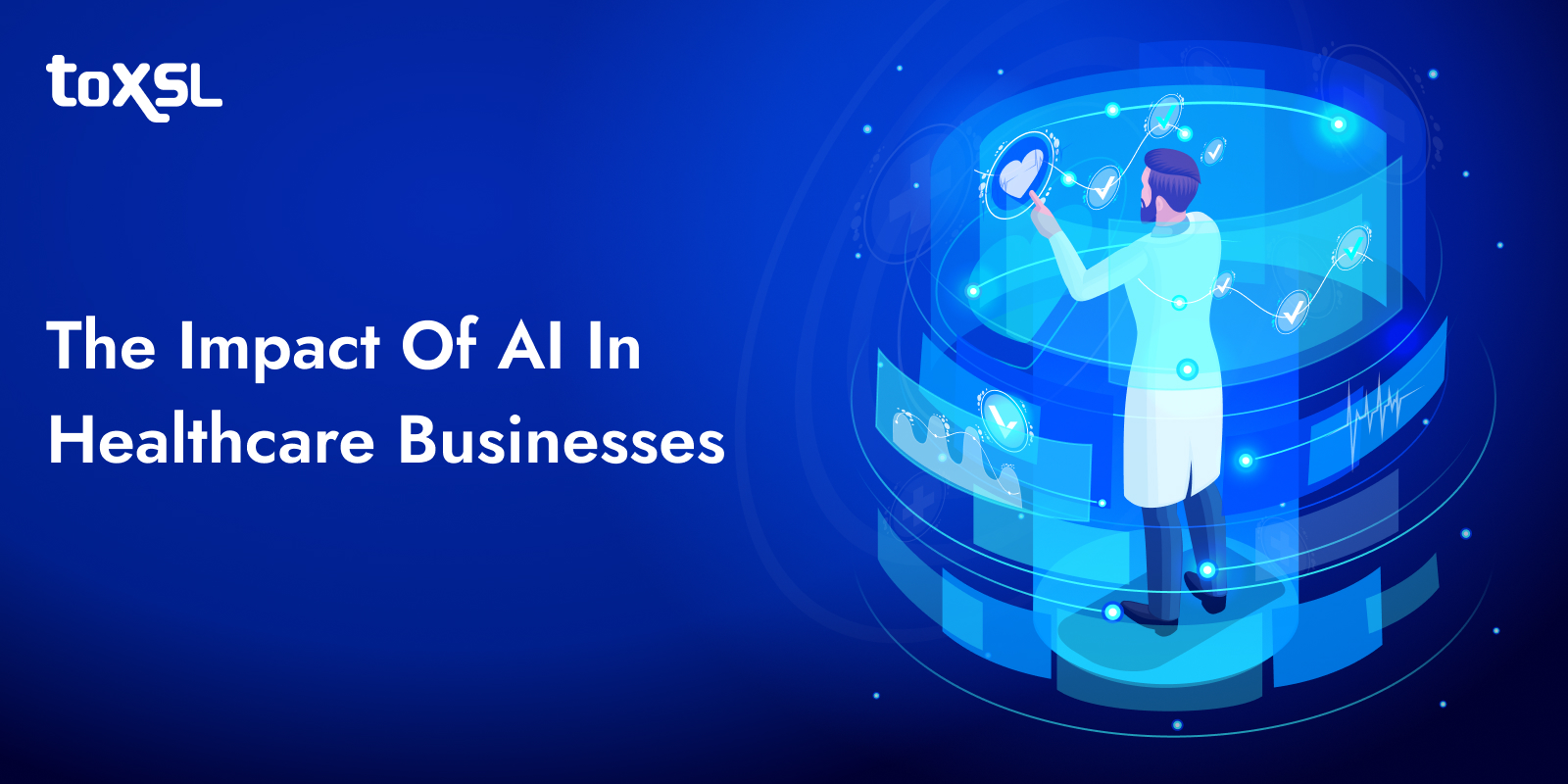
Artificial intelligence is becoming a transformational force in healthcare. How will healthcare employees and patients benefit from the impact of AI-driven tools?
AI and machine learning solutions are changing the way healthcare is delivered. There is a lot of data in the healthcare sector in the form of records, images, population data, claims data, and clinical trial data. AI helps healthcare employees analyze data and check for patterns that help them in diagnosis. These patterns are hard to find without analysis, so AI takes care of such hard-to-find things.
The key categories of applications involve diagnosis, patient engagement, adherence, and administrative activities. Moreover, numerous research studies say that in healthcare tasks, AI is performing better than humans.
In this article, we will discuss what AI offers and its impact on healthcare businesses.
The stats of AI in healthcare
AI has simplified the lives of patients, doctors, and hospital administrators. It is one of the fastest-growing industries. In 2021, AI sector funding was up 108 percent. Let us look at the stats of AI in healthcare.
- By 2028, The AI market can reach USD 95.65 billion at a compound growth rate (CAGR) of 46%.
- From 2022 to 2028, the pharmaceutical and biotechnology startups segment is supposed to grow at a high-paced CAGR.
- As per a Statista report, the global AI digital health market can reach 150 dollars by 2025.
- With the growth rate of AI sectors, AI applications can cut annual US healthcare costs by USD 150 billion in 2026.
- From 2022 to 2028, the Segment of AI in healthcare that is predicted to grow are pharmaceutical and biotechnology startups, natural language processing, and clinical trials participant identifier.
Moving further in the article, let us learn the types of AI in healthcare.
What are the types of AI in healthcare?
Here are the types of AI in healthcare, let us explain:

Natural Language Processing: Natural language processing is a field of Artificial Intelligence that allows computers to interpret and manipulates human language or data that resembles human language. It is developed on the concept of computational linguistics and has reshaped many fields, including the healthcare industry.
NLP is used in a wide range of healthcare applications, such as improving healthcare by better diagnosis, streamlining clinical processes, and providing more personalized services in institutions like Caribbean medical schools. Additionally, NLP helps with speech recognition, text analysis, text translation, and other stuff.
The process takes place in two ways:
- Statistical NLP
- Semantic NLP
Among these, statistical analysis is used more frequently, as statistical analysis is based on Machine Learning and neural networks. This makes Statistical NLP a more accurate type of Artificial Intelligence that helps in language recognition and text identification.
In addition, NLP functions as an analytical tool for handling unstructured data. And automatically generates reports about patients' diagnoses and transcribes their communication to conduct conversational AI.
Robotics Process Automation: Robotics Process Automation (RPA) may confuse users and make them think of the robot. But it has nothing to do with robots. These are computer programs on servers and use automation technology. It is capable of learning, simulating, and presenting rule-based business processes. Moreover, RPAs are easy to program and monitor.
AI healthcare businesses can use RPAs for regular tasks. These include prior authorization, updating patient entries, records, and billing. Furthermore, these can be integrated with other technologies, such as image recognition, to extract data.
Machine Learning: Machine learning is the most commonly used subset of narrow Artificial Intelligence. It has made it easy for healthcare sectors to operate by enabling artificial intelligence, thereby being used in medical diagnosis. Using machine learning in healthcare helps in processing large amounts of clinical documentation, identifying patterns, and making predictions about medical outcomes. It is highly trusted in analysis because of its highly accurate and precise results.
Implementing machine learning has helped healthcare professionals improve their treatments and reduce costs. Doctors can more accurately diagnose diseases or illnesses and customize treatment more efficiently.
Physical Robots: The surprising fact about physical robots is that every year, around 200,000 industrial robots get installed globally. These are supposed to do pre-defined tasks, including repositioning, lifting, welding, and assembling objects. As time passes, robots are gaining more popularity and becoming more efficient. They are developed and designed in a way that makes their movements quick and accurate. Moreover, it is seen that in healthcare, physical robots do their job properly and efficiently.
Rule-based Expert System: Expert systems are usually used for clinical decision support purposes and is used by healthcare startups and businesses over the last few years. With numerous electronic health records (EHR), providers integrate rule-based expert systems into their businesses. These systems require the help of human experts to embed the rules. These systems are easy to follow and process. But as the number of rules grows, they start to create conflicts with each other.
In addition, machine learning in healthcare is slowly replacing a rule-based system with approaches based on medical algorithms.
AI in Healthcare: The incredible innovations in the healthcare industry
Now, let us shed some light on the incredible innovations of all time in the healthcare industry.

Let us explain each of them in detail:
Diagnosis and Drug Development: COVID-19 gave a push to Artificial Intelligence in the healthcare sector. Machine learning is helping pharmaceutical businesses by increasing their efficiency in diagnosis. AI is helping medical professionals with CT scans to detect pneumonia, mainly for those who were treated for the signs of COVID-19.
One of the best examples of AI tools is Microsoft’s radiotherapy AI tool, Project InnerEye. This tool helps in reducing the time of 3D countering of the patient for about a minute, which previously used to take hours. If you are willing to learn more about this project, you can find the project on GitHub.
Mental Healthcare: AI is not only helping healthcare professionals in physical health; it is more than that. It is helping people in the field of medical health. Harvard University has developed machine learning algorithms to track mental health symptoms and attributes.
AI models are doing a commendable job of analyzing topics such as suicide, depression, grief, and more. Moreover, AI can detect chemical changes in the human brain. It helps AI in detecting human illness. Out of all the diseases, the most common disease diagnosed is dementia. Dementia is of many types, and the most common is Alzheimer’s. This mainly affects our memory and communication.
Moreover, AI models are trained in such a way that it is extremely easy for them to detect a person with dementia among all the speakers.
Augmented Reality and Mixed Reality in Healthcare: Augmented Reality and Mixed Reality are doing wonders when integrated with AI. It has become possible for surgeons to get mixed reality headsets such as Microsoft Hololens 2. These mixed headsets help by providing heads-up information to the surgeons. It gives them the luxury of using both hands during the procedure. Not only that, these headsets are useful during training. Moreover, augmented reality is helping nurses to find veins to draw blood.
Wearable: Wearable is one of the biggest innovations of all time. It allows users to monitor the status of the patient's health and heartbeats. It offers various features that can monitor physical health with pedometers and blood oxygen saturation. Also, wearable such as smartwatches with sensors is helpful to detect low blood oxygen saturation, as it is hard to track blood oxygen saturation. These watches are designed to function dynamically.
Moreover, they are working on adding functionality where the watches will be able to measure blood vitals. Photoplethysmography is an optical technology that is built to measure ups and downs in blood volume and composition.
Smart Pills: Smart pills are minute electronic devices that are designed similarly to those of pharmaceutical capsules that perform advanced functions such as sensing, imaging, and drug delivery. After taking these pills, they take a tour of your GI tract and collect pressure, PH, and temperature data.
Organ Evaluation and Transport: Organ evaluation and transplant serve as a constant helping hand in the organ care systems. It is the innovation of Transmedics, and using these organ care systems and body parts such as the heart, lungs, or liver can be kept out of the body for a couple of hours. A point to notice is that these organs are kept under proper medical assistance and provided with proper nutrients and care.
Bioprinting: AI is getting more advanced, and the innovation is beyond our imagination. Bioprinting is another exceptional example of that. It is a process of new organ creation, which starts with creating digital models of the tissues. This whole process is hectic as professionals take care of resolution and matrix structure.
Benefits of AI in Healthcare
After knowing the incredible innovations of AI, it is time to move on to the benefits that AI has in the healthcare industry.
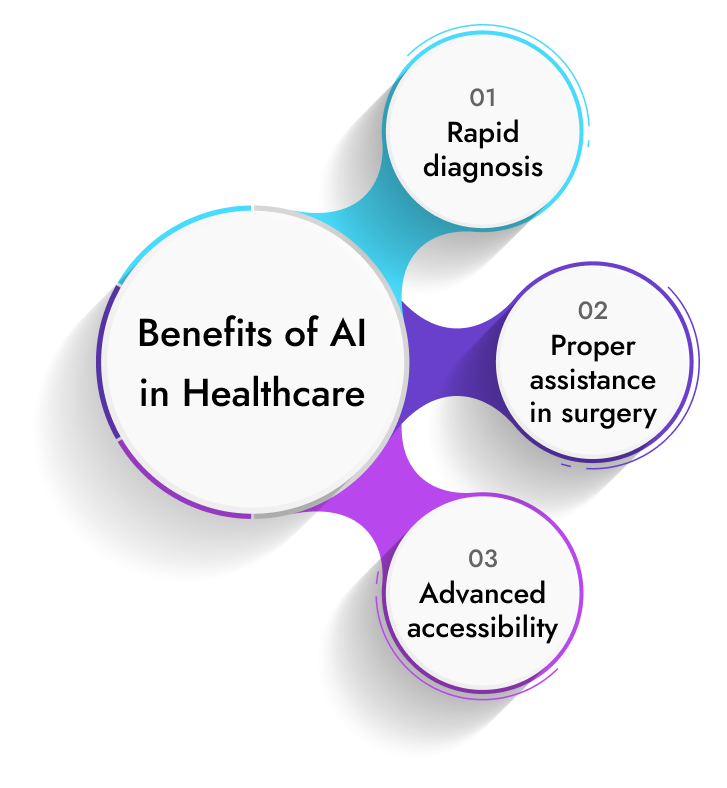
Let us explain each of them in detail:
Rapid Diagnosis: AI tools such as Google Health and InformAI have made it easy for healthcare professionals to do a diagnosis rapidly. These tools give data based on the current and previous health issues of the patients. Using tools, healthcare professionals can diagnose the illness before time and plan for the possible threats with effective solutions.
Proper Assistance in Surgery: With the emergence of AI in healthcare, AI surgical systems are available to help professionals to perform operations with no risk of side effects, blood loss, or pain. This makes it possible for the patients to recover with good speed.
Advanced Accessibility: AI has given rise to advancements, mainly in the healthcare industry. With that, it is helping the world in many ways and becoming more and more trustworthy. Many international and national healthcare organizations are developing notable applications that are assisting people who need them and are offering advanced accessibility.
The challenges that AI in healthcare brings
Here are the key challenges that AI in healthcare can face:
- Updating Regulations: AI systems can come into legal violation with the updated regulation in law. In cases where it is legal, patients must give their consent to get medical treatment using AI.
- Human Disagreement: There are a lot of agreements and disagreements when AI comes into play. There are a lot of professionals who do not wish to use AI in their work. With that, several patients disagree about trusting machines.
To Conclude:
The concept of Artificial Intelligence in the healthcare industry has changed the course of healthcare by making it more accurate and precise. If you take a closer look at all the innovations done in AI in the healthcare industry, especially startups, you will know the value of the same. We hope that you have understood how AI is impacting the healthcare sector.
Furthermore, if you are interested and looking for ways to expand your business, AI in healthcare is a golden chance for the healthcare business and the startups to grow. We suggest you take the help of professionals who are well-versed in the technology and know how to integrate AI into your healthcare business.
Lastly, are looking for an AI services provider company, look nowhere else than ToXSL Technologies. We are striving to help businesses in healthcare by developing AI solutions that can help them grow globally.
Our developers work with the supreme AI and ML models designed to grow your revenue, reduce cost, and offer a desirable customer experience.
If you wish to approach us for the same, contact us and let us help you empower your healthcare business with Artificial Intelligence.



